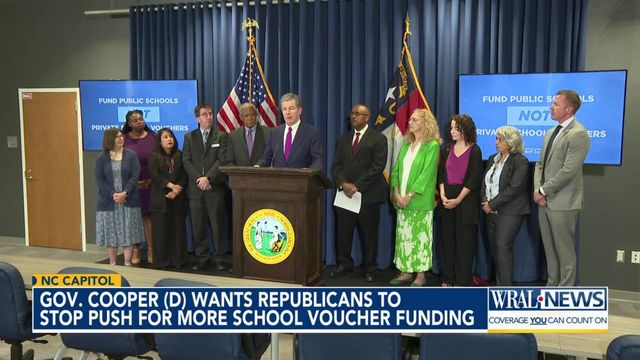Cooper: Voucher expansion plan 'shockingly irresponsible'
North Carolina Gov. Roy Cooper and Democratic state lawmakers gathered Monday to denounce Republican legislative leaders’ plan to dramatically expand funding for private school vouchers, saying it takes money out of public schools.
House Speaker Tim Moore and Senate Leader Phil Berger have said the expansion of the voucher program is one of their top priorities in the current session. Republicans argue that investment in private school vouchers provides some students a lifeline out of a public school that isn’t working for them.
A measure that passed the Senate on party lines last week would direct $463 million more to the program, bringing the total new funding for the program in 2024-2025 to $625 million.
Democratic lawmakers have since filed House Bill 993 to put a moratorium on the voucher program and require more reporting and accountability from participating private schools. It’s unlikely to receive a hearing.
Cooper told reporters Monday that that money would be enough to cover 8.5% average raises and $1,500 bonuses for most public school teachers, plus the restoration of extra pay for teachers with advanced degrees, as well as hundreds of new teaching assistants, nurses, counselors and psychologists in public schools.
Or, Cooper said, it could be used to keep child care centers’ doors open, boost the child care subsidy, and cover the full cost of North Carolina pre-K programs for tens of thousands of kids.
“This latest larceny — and that's what it is — is on top of the hundreds of millions in taxpayer money they've already siphoned out of our public schools for vouchers,” Cooper said. “It's shockingly irresponsible. If they tell you they don't have the money, that's wrong. This is all about priorities.”
Neither Moore nor Berger immediately responded to WRAL News's request for comment.
For years, the voucher program was limited to low-income students who were not already attending private school. Demand rarely met the available funding, which expanded every year.
In 2023, lawmakers scrapped the income limit cap for vouchers and made every student eligible, even if they were already attending a private school. Although lower-income families still took precedence, a waiting list of higher-income families quickly developed.
A measure that passed the Senate on party lines last week would direct $463 million more to the program to cover the waiting list.
During a recent debate on the Senate floor, Republican lawmakers pushed back on accusations that they’re giving the wealthy unneeded financial aid, saying that the money the state spends on education should follow the child to whatever school the parents choose, regardless of income.
GOP leaders have said they don’t intend to cut funding to public schools. But when a school’s enrollment goes down because students transfer to private schools, the school will receive less state money through the per-student funding formula to pay teachers.
Meanwhile, Cooper said, not all children have equal access to private schools, noting that private school options are particularly limited in the most rural parts of the state.
“Maybe the most confounding mystery is why so many rural legislators vote to take taxpayer money out of their own public schools and send it to the large number of private schools in the city?” Cooper said.











